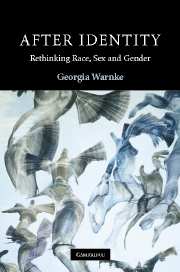Book contents
- Frontmatter
- Contents
- Acknowledgments
- Table of cases
- Introduction: reading individuals
- 1 The tragedy of David Reimer
- 2 Racial identification and identity
- 3 Race and interpretation
- 4 Sex and science
- 5 Rethinking sex and gender identities
- 6 Marriage, the military, and identity
- 7 Hermeneutics and the politics of identity
- Conclusion
- Index
Conclusion
Published online by Cambridge University Press: 22 September 2009
- Frontmatter
- Contents
- Acknowledgments
- Table of cases
- Introduction: reading individuals
- 1 The tragedy of David Reimer
- 2 Racial identification and identity
- 3 Race and interpretation
- 4 Sex and science
- 5 Rethinking sex and gender identities
- 6 Marriage, the military, and identity
- 7 Hermeneutics and the politics of identity
- Conclusion
- Index
Summary
The claim I have tried to make is that identities are parts of contexts and make sense only within the contexts of which they are a part. Just as the question of who Elinor Dashwood is makes no sense outside of the context of Sense and Sensibility, the question of who someone is or whether someone is black or white, male or female, Amish or student makes no sense unless we know with regard to what. Moreover, depending upon how I understand the whole of the text of which Elinor Dashwood is a part, I will understand who she is differently. If I place the novel in the context of onanism, I may understand her as an incestuous lover. If I understand her in the context of democracy I may understand her as a model of independence. Likewise, if I understand an ill child in the context of Western medicine, I will understand him or her as a medical patient. If I understand him or her in the context of Christian Science, I will understand him or her as an alienated soul. In concluding this book, I want to expand on two remaining issues.
- Type
- Chapter
- Information
- After IdentityRethinking Race, Sex, and Gender, pp. 245 - 248Publisher: Cambridge University PressPrint publication year: 2008

